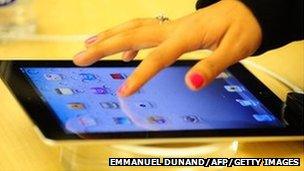School wi-fi 'not fit for 21st Century learning'
- Published

Only about a quarter of schools have wi-fi good enough for 21st Century learning, figures suggest
Pupils in England are at risk of missing out because their schools do not have good enough wi-fi, figures suggest.
Schools need fully accessible wi-fi if they are to embrace digital learning in all subjects, argues Valerie Thompson of the E-Learning Foundation.
But only a quarter of schools achieve this, suggests the British Educational Suppliers Association (Besa).
"It's vital to a 21st Century learning environment," said Ms Thompson.
The data comes from surveys of a representative panel of some 600 state schools across England, carried out by market research company C3 Education for Besa.
Of 250 secondary schools, about 22% said they had wi-fi in most or all classrooms, 39% had it in some classrooms, leaving 39% with wi-fi in only a few or no classrooms.
Of 350 primary schools about 28% had wi-fi in most or all classrooms, 22% had it in some classrooms, leaving half of all schools with wi-fi in only a few or no classrooms.
Wi-fi 'essential'
Ms Thompson argues that good wireless networks are essential if schools are to use digital technology to its full potential to transform education.
She says that the technology, along with informed and enthusiastic teachers, could give pupils the freedom to learn "in the sports hall, the playground or over lunch".
The government has already taken steps to update the teaching of computing in English schools, scrapping the old IT curriculum and including computer science as a core subject at secondary level.
Education Secretary Michael Gove has said he wants children to learn basic computer code in primary school and to be able to create basic animations and simple websites by the age of 11.
But Sean Larner, of wi-fi provider Xirrus, says that coding is only part of what could be done once "robust wi-fi networks" allow schools to detach digital technology from the IT suite.
Some schools are already experimenting with allowing pupils to bring their own devices such as smartphones and tablets to school. Others have invested in devices for every pupil.
Pupils use them to download assignments, carry out research and ask questions of teachers, fellow pupils and even subject experts from outside school - but without adequate wi-fi the use of these devices is limited, says Mr Larner.
"Wireless should be a given," he says, and schools and universities should provide the same access to it as they would water or electricity, using online filtering to block pornographic and other undesirable sites.
He says that it is only a matter of time before most lessons involve digital technology and exams are conducted online with papers downloaded at the start of the exam and marked in real time.
It's expensive, at about £15,000 to connect a primary school with 500 pupils and up to £50,000 for a large comprehensive.
But Mr Larner argues that it is vital that schools provide their pupils with good wireless internet: "If we don't take a long-term view and provide our kids with the right sort of online access there will be problems. There is a government responsibility here."
A spokeswoman for the Department for Education said: "Head teachers manage their own budgets and are best placed to decide the extent to which they make wi-fi accessible in their schools.
"We always make sure that the highest standards for wireless access are met in new schools and give grants to teaching schools so they can share successful ICT practice with others.
"In addition, all new teachers are trained to use ICT in the classroom, we make £1m available to schools every year for services such as video-conferencing, and have set up buying frameworks so schools get the best deals on ICT equipment and systems."
- Published7 January 2013
- Published4 January 2013
- Published16 November 2012
- Published12 July 2012
- Published29 March 2012
- Published14 January 2011